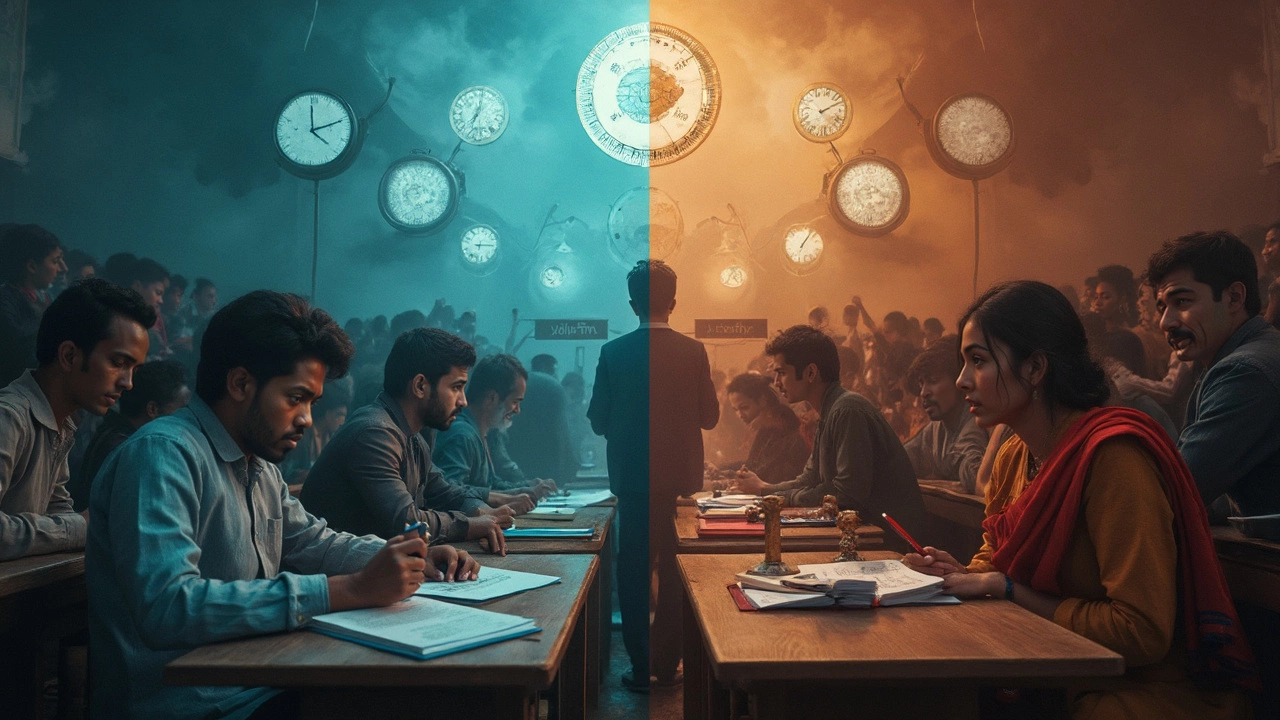Ever wondered what the most competitive exam out there really is? It’s not just about tough questions—some of these tests have pass rates that make lottery odds look friendly. You might think your finals are challenging, but the truth is, there are exams with millions of hopefuls fighting for just a handful of spots.
Take the UPSC Civil Services in India—over a million people apply every year and hardly a thousand make it through. Or look at China’s Gaokao, where your whole college future is decided by a two-day paper. The game isn’t just about brains; it’s about stamina, focus, and learning how to handle pressure without losing your cool.
If you’re facing any kind of competitive test, there are strategies that really work. Learning what the toughest exams demand can help you benchmark your prep. You don’t just need to study smarter; you have to keep your wits and learn from those who’ve survived these grueling challenges.
- What Makes an Exam Competitive?
- Toughest Exams Around the World
- Why Are These Exams So Hard?
- Real-Life Stories From Candidates
- Smart Tips to Prep for Any Tough Exam
What Makes an Exam Competitive?
Ever notice how some tests get way more attention than others? That’s because not every exam is built the same. A most competitive exam stands out for one big reason: the odds. When thousands—or even millions—of people fight for a painfully small number of spots, the pressure goes off the charts.
So what actually bumps up the competition? Two words: low pass rates. Take the CFA Level 1 for finance pros—less than half pass on a good year, and that’s after months of solid prep. Or Japan’s National Medical Exam, where cracking 80% is standard and missing by a question could mean another year of waiting.
Here’s what usually makes an exam fall into the ‘toughest’ category:
- Sheer number of people who take it—think Gaokao in China, with around 12 million candidates every year.
- Very limited number of available seats or jobs.
- Depth and width of subjects tested—some exams go crazy deep and cover a wide range of topics. UPSC in India wants you strong in history, politics, science, and more.
- Tricky formats—multiple rounds, interviews, group discussions, or long essay sections pile on the pressure.
- Long prep times—people often spend years getting ready. IIT-JEE in India sees kids starting prep at age 14.
You’ll also see toughest exams in careers where the jobs change lives or handle big responsibilities. For example, med school and law entrance exams are beasts because stakes are sky-high.
Let’s look at a quick comparison of just how competitive a few big-name exams are:
| Exam | Number of Candidates (Approx.) | Seats/Pass Rate |
|---|---|---|
| UPSC Civil Services (India) | 1,100,000 | ~1,000 (0.1%) |
| Gaokao (China) | 12,000,000 | Top colleges: <1% |
| CFA Level 1 | 270,000 | ~39% |
| Bar Exam (USA) | 80,000 | 60-90% (varies by state) |
So, what’s the secret sauce? Huge applicant pools, limited openings, and years worth of material. If you’re picking your goal, check out these stats. You’ll see why the most competitive exam has become legend in some places.
Toughest Exams Around the World
When people talk about the most competitive exam, a few clear names come up almost every year. Some of these are so challenging that even cracking the first stage is a badge of honor. Let’s look at what makes these exams notorious—and which ones are always topping the charts.
1. UPSC Civil Services Exam (India)
This test is known as a life-changer for millions of Indians. Around 1.1 million people register each year, but less than 0.1% finally wear the officer’s badge. The whole process takes almost a year and includes three stages: Prelims, Mains, and the Interview. It covers everything from current affairs to ethics, and even essay writing. It’s not just about intelligence; you need nerves of steel.
2. Gaokao (China)
The Gaokao shows up on every list of the toughest exams. Students call it the “life-deciding test” because your score decides if you can even apply to the good universities. The average student spends years prepping, and during Gaokao week, whole cities seem to hold their breath. Pass rates aren’t the issue—what counts is the small number of seats in top colleges and the pressure cooker environment.
3. IIT JEE (India)
If you want to enter India’s highest-ranked engineering colleges, you’ll have to survive the JEE Advanced. More than a million students write the JEE Main, but only about 150,000 get through to the Advanced. Seats at IITs are so limited that only 1 in 50 applicants make it. The questions can be so tricky that even talented students struggle to finish in time.
4. CFA Exam (Global)
Finance pros know about the CFA exam’s low pass rates. With three levels, each one eats up about 300 hours of your time. In 2023, the Level 1 pass rate was just 39%. Not only do you need to memorize formulas, but you also have to apply them fast to real-world cases, which isn’t easy under high-stress conditions.
5. USMLE (USA)
If you want to practice medicine in the USA, the United States Medical Licensing Examination will test your memory and stamina in ways you didn’t think possible. Step 1 alone sees a huge chunk of candidates stressing for months. There’s no miracle trick; success takes a smart study plan and relentless practice.
| Exam | Pass Rate | Number of Candidates (Approx.) |
|---|---|---|
| UPSC Civil Services | ~0.1% | 1,100,000 |
| Gaokao | 20% (top-tier colleges) | 11,000,000+ |
| IIT JEE Advanced | ~2% | 150,000 (Advanced) |
| CFA Level 1 | 39% | 250,000 |
| USMLE Step 1 | 97% (US) / 73% (IMGs) | 70,000+ |
What’s common? These toughest exams aren’t just about memorizing facts. They measure your grit, your test skills, and your ability to stay cool under pressure. If you’re preparing for any of these, don’t just look at books—learn how to handle both nerves and time limits.

Why Are These Exams So Hard?
So, what actually makes a test the most competitive exam? It’s not just about the subject being complicated. The toughest exams throw a bunch of unique challenges at you, and it’s a mix of these things that push the difficulty through the roof.
For starters, let’s talk numbers. A big reason these tests are so tough is the sheer competition. For example, the IIT-JEE in India draws about 1.2 million candidates every year, with less than 2% actually making the cut. The odds are similar in exams like the UPSC, with success rates under 0.2%. That means you’re fighting for your seat with hundreds of others, not just a handful in your classroom.
Another big factor is the scope. Some of the toughest exams cover way more ground than what you tackle at school. The Gaokao in China is known for testing a massive range of knowledge and the questions go deeper than what textbooks teach. The sheer volume means you have to start prepping years in advance, not just weeks or months.
Let’s not forget the pressure. A lot of these exams, like South Korea’s Suneung or Japan’s National Center Test, are “all-or-nothing” situations—one shot to get it right, no retakes anytime soon. That ramps up the stress big time. People often spend years in after-school academies (called "cram schools" or "hagwons") just to get ready for one day.
- Massive participation numbers—often millions, for just a few thousand seats
- Extensive syllabus and tricky application-based questions
- High cut-off marks, so even tiny mistakes can end your chances
- No margin for error; intense time pressure during the test
- Emotional and social expectations from families and communities
Here’s a quick snapshot of competition levels in known toughest exams:
| Exam Name | Applicants | Success Rate |
|---|---|---|
| UPSC (India) | 1 million+ | < 0.2% |
| Gaokao (China) | 10 million+ | < 2% |
| IIT-JEE (India) | 1.2 million+ | < 2% |
| USMLE Step 1 (USA) | Over 41,000 | Approx. 96%* (among medical graduates) |
*USMLE has a higher pass rate since it’s taken by already-selected medical students. Still, the prep and pressure are major.
So next time you hear someone complaining about exams, remember: the real monsters are those with crazy competition, gigantic syllabuses, and intense make-or-break pressure. That’s what earns them the title of most competitive exam.
Real-Life Stories From Candidates
The people who take these most competitive exams aren’t just statistics—they’re real folks with dreams, fears, and epic tales of long nights and crammed calendars. Let’s get into what it's actually like from the trenches.
Priya Patel, who finally cracked the UPSC Civil Services exam on her third go, describes waking up at 4 a.m., cycling through mock tests, and avoiding social media for over a year. She said the pressure didn’t just come from the exam but also from friends and family. “You feel like you’re letting someone down with every failure, but each time I learned something that helped for the next try.” Only about 0.2% of applicants clear this tough exam each year.
In China, Li Wei talked about the Gaokao as the single most important event of his teenage life. He recalled, "My whole town was quiet during exam week—shops open late, family cooks your favorite food, and everyone whispers.” Results decide not just your college, but your status in the community. The stakes, and the stress, couldn’t be higher.
Let’s check out some factual numbers on exam difficulty and pass rates for three notorious exams. This gives you a real sense of what these candidates are up against:
| Exam | Number of Candidates (2024) | Pass Rate |
|---|---|---|
| UPSC Civil Services (India) | 1,100,000 | ~0.2% |
| Gaokao (China) | 12,910,000 | Varies, <2% enter top universities |
| All Souls Prize Fellowship (UK) | 90 | 2 to 3 per year |
Stories from folks preparing for South Korea’s Suneung exam get even more intense. One candidate, Min-Jae, said, “Every meal, every conversation, every hobby took a back seat for a whole year. My wall was covered with sticky notes—formulas, dates, vocabulary. I fell asleep more than once with a textbook as my pillow.”
If you ask these test-takers what made the difference, it’s rarely just raw intelligence. It’s the grind—the daily routines, staying away from distractions, and finding ways to keep mental health in check.
- Sticking to a repetitive, structured schedule.
- Taking regular, guilt-free breaks to avoid burnout.
- Getting honest support from people who understood the pressure.
So when folks talk about the toughest exam or what makes something a most competitive exam, these stories put it in real perspective. The hardest battle isn’t just the test, but the months or years leading up to it.

Smart Tips to Prep for Any Tough Exam
Tackling the most competitive exam isn’t about last-minute cramming or pulling all-nighters. People who pass these really tough exams usually have a game plan—and stick to it. Here’s what actually works, based on the habits of top scorers and advice from experts who know their stuff.
- Start Early and Break Stuff Down: Even for the toughest exams like the Indian UPSC or the US Bar Exam, most toppers say starting months (sometimes a year) before the test makes a huge difference. Divide what you have to learn into bite-size chunks so you never get overwhelmed.
- Practice Under Real Exam Conditions: Find sample papers or last year’s actual tests. Sit down, set a timer, and solve them as if it’s the real thing. This helps with time management and reduces panic when the actual day arrives.
- Review Consistently, Not Just Once: Spaced repetition—where you review info over increasing intervals—actually helps you remember more. Apps like Anki or even just flashcards can totally change how much you retain.
- Know the Syllabus and the Pattern Inside Out: Some tough exams change formats or priorities every few years. Check the official website for the most recent structure and stick to that. Wasting time on outdated stuff isn’t worth it.
- Take Care of Your Body: Everyone says this, but here’s the real reason: studies, like one published in The Journal of Sleep Research in 2022, found that students who got regular sleep scored on average 10-15% higher on high-stakes exams.
- Join a Study Group: You don’t want to stay stuck on a problem for hours if someone else has the answer. Even one session a week can help fill in gaps you didn’t notice on your own.
“Relying only on hard work isn’t enough. It’s the mix of right strategy and self-care that gives an edge.”
— Dr. Shalini Gupta, former UPSC topper and mentor
It helps to look at how people beat the odds. Take Japan’s National Center Test, where less than 20% get into top universities. Nearly all successful students used mock tests to simulate pressure. In fact, a survey by PrepScholar in 2023 showed that 82% of exam high performers practiced with more than twelve full-length mock exams.
| Exam | Avg. Prep Time (Months) | Mock Tests Taken |
|---|---|---|
| UPSC (India) | 12 | 15+ |
| Gaokao (China) | 10 | 10+ |
| US Bar Exam | 6 | 8+ |
If you want the edge in any most competitive exam, treat prep like a process, not a panic. Plan early, drill the right stuff, rest up, and you’ll already be ahead of most people.
